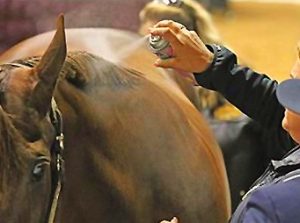
Tipping Etiquette in the Horse Industry
Click here to read the complete article194 – November/December 2018
To Tip or NOT To Tip ? An in-depth look at TIPPING ETIQUETTE in the horse industry.
BY PAIGE MORGAN
 When you receive the bill at a restaurant, get a haircut, or hail a cab, there’s a general understanding of how much you should tip. Typically, it’s based on the quality of service or a predetermined percentage that’s accepted by the general public as the norm, but what about the person who bands your horse? What about your farrier or the barn help who cleans stalls and longes horses? Yes, they’re already being paid for their time and services, but is a tip deserved? With so many variables,
When you receive the bill at a restaurant, get a haircut, or hail a cab, there’s a general understanding of how much you should tip. Typically, it’s based on the quality of service or a predetermined percentage that’s accepted by the general public as the norm, but what about the person who bands your horse? What about your farrier or the barn help who cleans stalls and longes horses? Yes, they’re already being paid for their time and services, but is a tip deserved? With so many variables,
professions, and extra costs associated with showing horses, when to tip or how much to tip is a tricky and often taboo subject.
POINTS TO CONSIDER
What does their workload/day look like?
If a trainer brings nine horses to a horse show and only one as sistant, that person is likely feeding, cleaning, longing, saddling, washing, etc. Their days are long and demanding. Although they knew what they were in for by agreeing to work that position, hard work should always be rewarded.
A seasoned Select rider with Simon’s Show Horses, Marylyn Caliendo, explains, “I’m there to compete, and if I had to do what they do at all hours, I would be exhausted. We really appreciate what they do for us at the shows. The bottom line is that it’s not an easy job and not everyone can do it.”
Is this person a full-time employee or “day help”?
Most assistants, whether full- or part-time, aren’t getting rich while working for a horse trainer. Their true “payment” comes from investing their time into their future by bettering their skills, learning from a seasoned veteran, and being exposed to the day-to-day management responsibilities of a training facility. Bear in mind that they’re often working longer hours and doing quite a bit of manual labor. On the other hand, “day help” can often be youth kids looking to lower day fees, or fellow horse crazy adults who have regular day jobs but are looking to scratch their horse itch or pick up some extra cash. For this reason, some feel that tipping full-time assistants is more worthwhile, because they’re the people who are in constant contact with your horse on a daily basis.
For Caliendo, it doesn’t matter whether the help is full-time or not. “They are there to work, offer good service, and receive tips, so we don’t think any differently about who helps get us to the pen,” she says.
Your Budget
Tips are a financial expense that should be included in your horse show budget; but if you find that money is tight, consider alternatives. Don’t discount simple acts of gratitude. Saying thank you and taking notice of the amount of effort put into making you and your horse a success goes a long way. A simple gesture of providing a hot coffee in the morning or sandwich around lunchtime speaks volumes. Volunteering to provide snacks or food runs when the show is running long, or the day is going quickly, helps keep the trainer and the help happy and working well.
Click here to read the complete article194 – November/December 2018

Recently Added
- EC Video of the Day – Shay Foust and Mr. Bear February 6, 2025
- 2025 AQHA Convention: Director Applicants and Committee Agendas February 6, 2025
- How to Clip Ears with Trainer Stacey Colgan February 5, 2025
- Federal District Court Ruling Weakens Key Soring Protections But Leaves USDA Oversight Intact February 5, 2025
- EC Photo of the Day – Smile and Be Grateful February 5, 2025
- AQHA and Breyer Collaborate to Commemorate AQHA Best Remuda-winning Ranches February 5, 2025
- Congratulations to Scott Jones and Nathan Turner on their Engagement! February 4, 2025
- EC Photo of the Day – Focus on the Journey February 4, 2025
- Super Sires at 2025 Florida Gulf Coast – Over $4,200 Added February 3, 2025
- 2025 AQHA Level 1 Championships Entries Now Open February 3, 2025
Archives
Sign In
Equine Chronicle ® All Rights Reserved. Copyright © 2025
4727 NW 80th Ave. • Ocala, FL 34482 • 352 369 1104 • FAX 352 369 1521
Privacy Policy | Questions, please contact The Equine Chronicle
-








